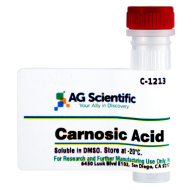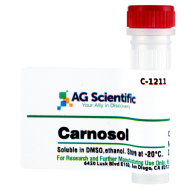Carnosic acid is a plastidial catecholic diterpene found in herb extracts such as rosemary, sage and oregano. Carnosic acid has anti oxidant and anti microbial properties. Carnosic acid is increasingly exploited within food, nutritional health and veterinary medicine.
Medicine: Novel Neuroprotective Compound
Carnosic Acid has potent antioxidant and potent neuroprotective activity. It has been suggested to be beneficial in prevention of neurodegenerative diseases such as Alzheimers and Dementia. The neuroprotective activity is due to induction of antioxidant enzyme expression through activation via Keap1 & Nrf2 transcriptional pathway.
The Anticancer effect of rosemary extract has been reported.
Along with carnosic acid there are two other compounds found in rosemary leaf extract - carnosol and rosmarinic acid. All three compounds have anti angiogenic effects.Veterinary Medicine
Carnosic acid is one of the compounds found in crude extract of Oregano, Origanum Vulgare. This extract has been tested for its efficacy against Equine Arteritis virus. Equine Arteritis virus causes outbreaks of equine viral arteritis, that results in significant losses to horse industry due to:- Foal loss in pregnant mares
- Death of young foals
- Carrier state of stallions
Food Industry
-
One of the major reasons for the deterioration of food is the auto-oxidation of lipids by which free radicals are produced.
-
Oxidation of lipids is a common, undesirable chemical change which impacts flavor, aroma, texture and nutritional quality.
-
Anti-oxidants are substances that prolong the shelf life of food by delaying the oxidation process.
-
Rosemary extract contains natural anti-oxidants. The extract mainly contains three kinds of anti-oxidant molecules: carnosic acid, carnosol and rosmarinic acid that inhibit the oxidation of other molecules by getting oxidized themselves.
-
This helps in extending the shelf life of the end application by fighting rancidity in oils and fats, and stabilizing natural colors.


